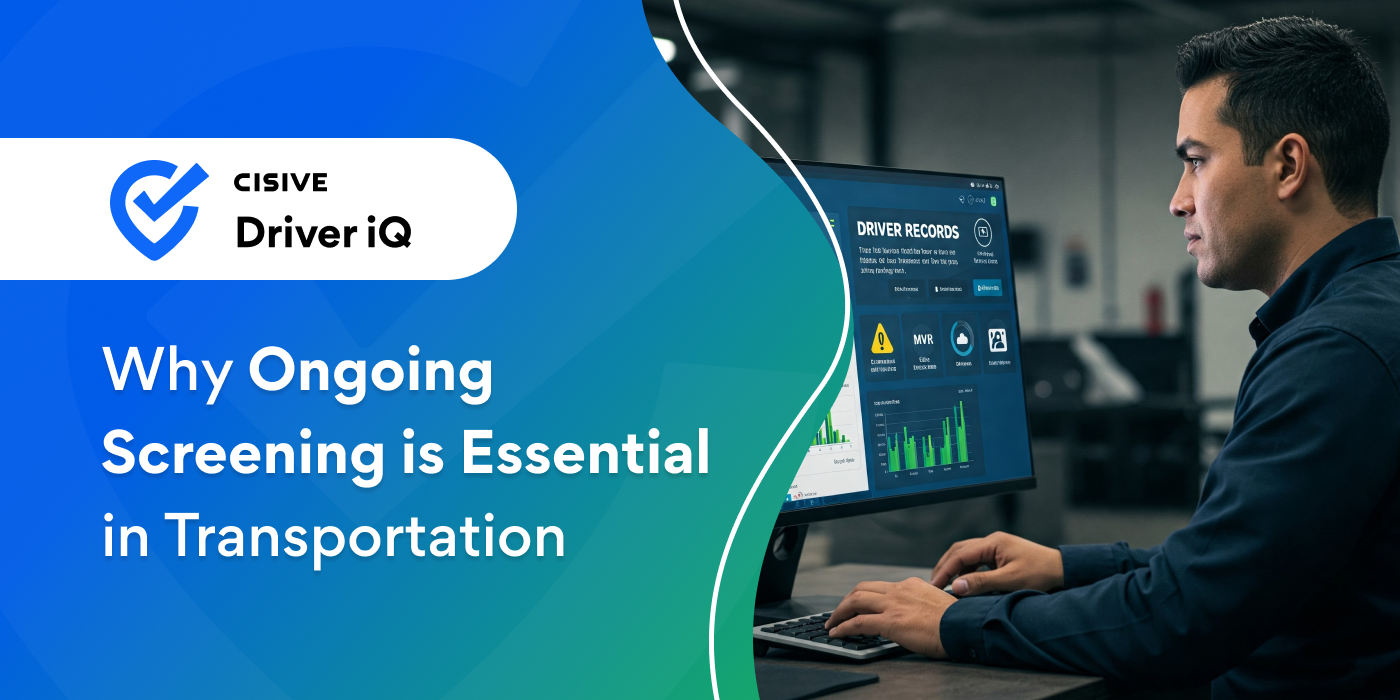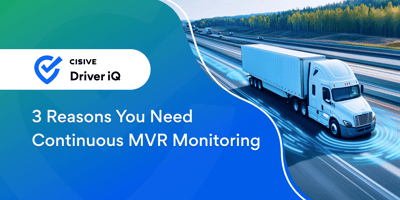

Keeping your fleet safe requires more than periodic checks. A real time MVR monitoring program...

You don't always know what your drivers do when they're off the clock, but those actions could affect their driving abilities and even their qualifications to remain a driver for your company. Even if a driver passes their applicant screening, they could receive violations or charges later that impact their standing as a safe, reputable driver.
Keeping a risky driver behind the wheel for your company increases your liability and could result in devastating situations, such as serious accidents. With ongoing monitoring for trucking employees, you spot those issues quickly after they occur so you can take appropriate action.
Programs like Driver iQ save you time and money by keeping your team safe and responsible.
Key TakeawaysHere are the key topics you need to know about ongoing monitoring in trucking:
|
Ongoing monitoring in trucking uses a monitoring program to give you near real-time alerts if an employee's driving or criminal record changes after their initial employment verifications. Manual checks happen less frequently, which could result in you missing important information about your drivers, such as new criminal activity or a license revocation.
Monitoring your drivers continuously protects your business by letting you find out about issues right after they happen. Without ongoing monitoring, it would be a year or more before you pull reports manually and identify an issue that would prohibit the driver from operating one of your vehicles.
Motor vehicle record monitoring tracks all types of driving violations and changes to license status. Information you can gain from this type of monitoring includes:
You can also use continuous monitoring for criminal record checks. You'll receive alerts if a driver's background check flags a new issue, which could include:
Monitoring your team's driving and criminal records is different from using surveillance tools to track their driving.
Surveillance devices in trucking include electronic logging devices, driver-facing cameras, dash cameras, and GPS-based telematics systems. They let you track how well your drivers are performing and whether they're following trucking regulations.
Record monitoring looks at violations that show up on official records after they happen. You're not watching your drivers' performance nonstop, but you are looking for changes to their records.
When you monitor databases for new information, you access information that is available to you as the employer. It's information that is accessible with permission from the employee.
While your drivers might not want you to have this information because it could affect their employment, you're responsible for monitoring those records regularly. Choosing a reputable monitoring program means you get a product that follows all privacy laws and securely stores employees' private information.
Trucking staff monitoring uses digital tools to identify changes to an employee's driving or criminal record. It's an automated software program that constantly checks for changes and alerts you when it finds something.
Continuous monitoring programs pull data from various sources to give you a comprehensive look at your drivers. They use the state motor vehicle databases for the states where the driver holds a CDL to check driving records.
When you monitor criminal backgrounds, the software program should look for records from both state and federal sources. It should also look for civil action involving your drivers.
When you monitor your drivers' records manually, you need to order a motor vehicle report yearly. If a new violation happens shortly after you do your annual check, you might not find out about the issue until almost a year later.
With continuous monitoring programs, the software automatically checks the records in real time. That constant review of your drivers' records lets you get alerts faster when something changes.
High-quality programs like Driver iQ provide near real-time alerts when they detect new information on a driver's record. Receiving these alerts makes monitoring hands-off because you don't have to remember to check the results manually.
Yes, there are monitoring services designed specifically for the trucking industry. Driver iQ is a leading option that is the #1 screening partner for the trucking industry.
When you choose a program designed specifically for trucking, you get the details you need to keep your fleet safe. Those programs monitor the issues that are most important to a trucking company.

Continuous monitoring helps you take a more modern, automated approach to tracking your drivers. It saves you time and ensures you find out about violations as soon as possible to improve your retention and roster management.
Violations on driving and criminal records often indicate risky behaviors that could affect a driver's safety on the road. That's particularly true of DUI charges, drug violations, and moving violations.
With continuous monitoring, you learn about new risky behaviors faster. This allows you to take appropriate actions quickly.
If you rely on yearly manual monitoring, it could be several months before you discover the risky behaviors. The problem could get worse during that time and become more challenging to handle.
For example, reckless driving is a criminal offense that shows disregard for the safety of others. Ongoing monitoring helps you find that criminal charge quickly and prevent the driver from driving recklessly while on your payroll.
Leaving an unsafe driver behind the wheel risks the lives of your staff members and any other drivers on the road. It also risks the safety of your vehicles.
Minor driver violations help you identify areas for training that could make your drivers safer on the road. It could help you keep an otherwise good driver on the team by equipping them with improved driving skills that keep them safe.
If you need to remove a driver, you make the road safer for everyone. You also reduce the risk of losing money caused by major damage to your vehicles or products.
Your company could be held liable for accidents and unsafe driving conditions caused by your drivers. This could be an expensive situation, depending on how much damage the driver causes.
Trucking companies can be held responsible, particularly in cases of negligent hiring and retention of drivers who have an unsafe driving history. You might also get in trouble for not providing the proper training and supervision for your drivers.
Having a driver on your team who has serious criminal charges or major traffic violations affects your company's reputation. It may make your organization look irresponsible or give the impression that you don't care whether your drivers are safe.
The damage can be even worse if those risky drivers cause accidents or other issues while driving for your company. If you recognize the risk early, you can remove those drivers from the road or get them the support they need to improve.
Monitoring your employees regularly also sends the message that you're a safety-focused company. It shows that you're being proactive and hiring responsible, safe drivers.

Ongoing monitoring can occur in several ways. Monitoring your team's driving habits, criminal behavior, and other potentially risky choices helps you make appropriate staffing and training decisions.
You're responsible for checking the motor vehicle reports of all of your drivers at least once every 12 months. Ensure you schedule those checks correctly to avoid running late, or use an ongoing MVR monitoring service.
For example, drivers need to have DOT physicals regularly — an exam is typically valid for up to 24 months. Ensure you understand all screening requirements and schedule them appropriately before you pass the deadline.
If you decide to use MVR monitoring services, it's important to let your team members know you're keeping an eye on their records. This offers transparency and ensures you remain compliant.
Making your staff aware of your screening practices may also encourage improved driving behaviors. If they know you're constantly monitoring their records, they may try to avoid violations proactively.
New hires must pass drug and alcohol testing as required by the DOT. Drivers also need to be tested at other times, including after accidents, when there's reasonable suspicion, after returning to work from a violation, and as a follow-up after a violation.
Random testing is also required of trucking companies. Ensure you understand your responsibilities for drug and alcohol testing and follow them strictly as another ongoing screening option.
Trucking industry regulations can change at any time, including the rules surrounding monitoring driving records. Verify that you're operating under the current guidelines.
It's also important to keep up with changing regulations. This allows you to change your monitoring practices quickly to stay in compliance and avoid penalties.
Keeping documentation on what you find from your monitoring efforts helps you maintain compliance with monitoring requirements. It shows you've been proactive in tracking changes to driving records.
Having the documentation can also prove cause for disciplining, retraining, or firing an employee. Accurate record-keeping is an important protection for you as a company.
Ideally, you won't ever have to deal with a violation popping up through ongoing monitoring. However, it's important to be prepared should the situation arise.
Decide how you'll verify the information and make a decision about next steps. You might have standard repercussions for common violations, such as driver training for minor incidents.
Being prepared helps you take quick action when you receive an alert. This can minimize any possible negative outcomes for your company, such as removing a reckless driver before they cause an accident.
The quality of your results depends on the reliability of the monitoring service you choose. A trucking-specific service such as Driver iQ tailors the solutions to your industry.
When you choose Driver iQ, you get a comprehensive solution for managing all types of driver information. The program's easy-to-use interface and accuracy improve your results.
Driver iQ and similar trucking-specific services help you track your drivers effectively by incorporating industry regulations. Investing in a specialized program saves you time by giving you constant monitoring and alerts when something pops up.
With ongoing monitoring, you effortlessly manage your annual MVR check requirements. Plus, you don't have to wait several months until your next manual check to identify drivers who need corrective actions or removal from your driver roster.
Even if a new driver passes all of the appropriate checks, their driving and criminal records could change over time. Using an ongoing monitoring system for trucking alerts you to issues quickly so you can take appropriate measures to address driver violations, protecting your company and your team.
Book a consultation with a Driver iQ expert to learn more about the solution and how it will benefit your company.
Author: Michael Kapuschinsky
Bio: Product Manager with more than a decade of experience in the transportation industry.
Let's Connect on LinkedIn
Keeping your fleet safe requires more than periodic checks. A real time MVR monitoring program...

Picture this: You hired a driver with a clean driving history, and he’s worked for you for over a...

Hiring a commercial driver means placing your company’s reputation and safety on the road every...